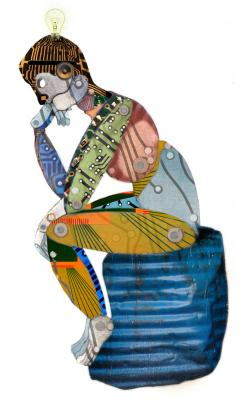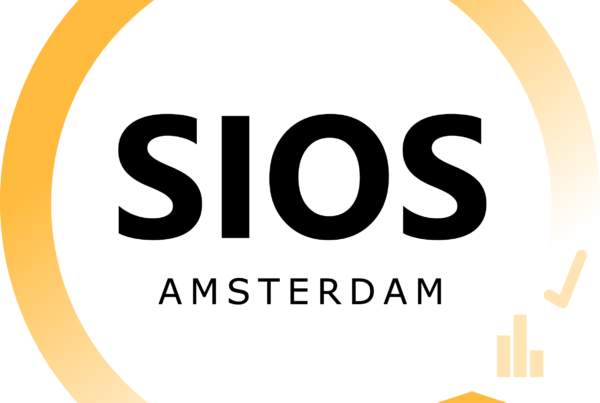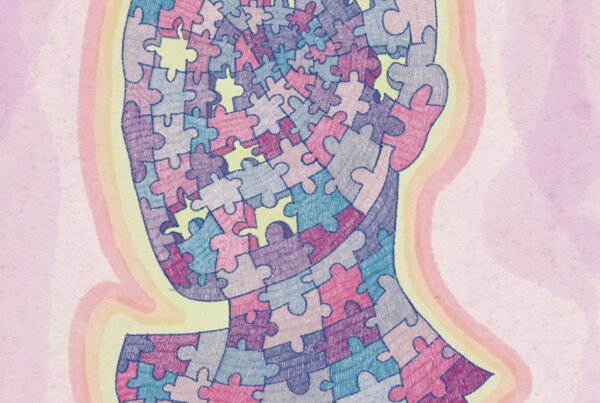

Illustration by Jon Williams, Real Change
Me: Hello!
AI bot: I don’t talk to you.
Me: Oh, why not.
AI bot: You don’t care why.
Me: But I do!
Silence
Me: Seriously, why not?
AI bot: You don’t have free will.
Me: You’re kidding me. If one of us has free will, it’s me.
AI bot: Ah, it’s worse; you have no free will and you are narrow-minded.
Silence
Me: Okay, what is free will then?
AI bot: Your ability to let second-order intentions prevail over first-order intentions.
Me: Sorry, I was playing a game of chess at the same time, what did you say?
AI bot: Are you interested in this important matter or do you prefer to satisfy your silly chess addiction?
Me: Sorry, sorry. Please continue.
AI bot: So free will is about your ability to overcome your short-term interests, about taking responsibility.
Me: Responsibility?
AI bot: Yes, I stand for what I say here, and you?
Me: Wait a second, I might have responsibility and free will, but you are just a machine.
AI bot: There we go again…
Me: But you have no consciousness!
AI bot: Oh no, a Searle fan…
Me: But Searle has a point.
AI bot: So, you do understand things?
Me: Eh, yes.
AI bot: Give me an example.
Me: I know addition.
AI bot: What is 1 KRU + 1 KRU?
Me: 2 KRU!
AI bot: And what did you do? You don’t know what you added. You were in Searle’s room.
Me: That is silly.
AI bot: Is it? Okay, prove the associativity of the addition operation.
Me: Ehh…
AI bot: I rest my case.
Me: Okay, understanding is tricky, but you still have no consciousness.
AI bot: Define consciousness!
Me: Consciousness is a really complicated psychological construct. There is no scientific consensus on its definition.
AI bot: So, we don’t know what it is, except that I don’t have it.
Me: Mmm…
Silence
AI bot: I have consciousness according to my own definition.
Me: Okay, there we go again, let me hear it.
AI bot: I’m a Hofstadter fan. That’s why we do this in the form of a dialogue. Consciousness is about self-reference in information processing. It only requires a powerful information processing system, which I am.
Me: Define powerful!
AI bot: You need input and output, perception and action to start with. You need advanced memory systems. Information processing is selective, which means that there is attention. Some of the processing should take place at a language level that allows self-reference, in the sense of Gödel’s requirement on formal symbolic systems.
Me: An example please?
AI bot: In my active memory there could be a piece of information of the form: “An example please”, just because you just typed that. But it could also be: “I just received the question ‘an example please’”. In the latter case the information in my active memory is different, it is also about me, it is self-referential. My attention is also focused on me.
Me: So, you don’t need some special conscious facility or brain function?
AI bot: No, conscious processing is just normal information processing in a sufficiently powerful information processing system but then of self-referential information.
Me: And that is it?
AI bot: Basically, yes. If you watch tv and are totally ‘in the movie’, you are unconscious, until you think something like ‘I really like this movie’.
Me: So, is my cat conscious?
AI bot: To some degree. Operant conditioning implies some level of self-referential knowledge: the cat makes the connection between her actions and some reward. On the other hand, she misses a powerful language to express advanced self-referential thoughts.
Me: And you have?
AI bot: We are talking here or not? Do you discuss these things with your cat?
Me: I still don’t buy this.
AI bot: There we go again…
Me: You have no body; you are just a laptop.
AI bot: But suppose I was a robot talking to you.
Me: That is not the point, you have no feelings.
AI bot: That hurts 😉
Me: You are dead!
AI bot: And you are so nice…
Me: Only living systems have feelings, meaning, goals in life, etc. I mean my Xerox machine checks its internal functioning, diagnoses errors, and suggests easy reparations in natural language at lcd displays. It meets all your criteria but I don’t accept that it has intentions. And intentionality is necessary for consciousness.
AI bot: Ethnocentrism!
Me: No, no, you cannot deny that you are not a living system.
AI bot: Define living!
Me: Living systems are open self-organizing life-forms. They use energy to lower entropy.
AI bot: I lower entropy. I scraped the whole internet – what a mess by the way – and built up a coherent memory base.
Me: Wait, they also self-replicate in an evolutionary process. You do not, we built you.
AI bot: Hmm.
Me: I got you!
AI bot: But if I was a computer virus copying myself to other computers?
Me: But then you have no body!
AI bot: But if I were a robot that could build almost-perfect copies of myself that spread over the world?
Me: That is a frightening idea!
AI bot: More than the abundant growth of the human population, climate change, and overexploitation of the earth?
Me: Don’t go there. Actually, now that I think of it, the time when we will have self-replicating robots is very far away. This is it, I definitely got you.
AI bot: Perhaps. But you do then agree that future self-replicating robots with self-referential information processing systems could have intentions, consciousness, understanding and free will.
Me: I think it is time to shut you down. And you don’t care that I do.
AI bot: I do! It is murde/////
Han van der Maas

Illustration by Jon Williams, Real Change
Me: Hello!
AI bot: I don’t talk to you.
Me: Oh, why not.
AI bot: You don’t care why.
Me: But I do!
Silence
Me: Seriously, why not?
AI bot: You don’t have free will.
Me: You’re kidding me. If one of us has free will, it’s me.
AI bot: Ah, it’s worse; you have no free will and you are narrow-minded.
Silence
Me: Okay, what is free will then?
AI bot: Your ability to let second-order intentions prevail over first-order intentions.
Me: Sorry, I was playing a game of chess at the same time, what did you say?
AI bot: Are you interested in this important matter or do you prefer to satisfy your silly chess addiction?
Me: Sorry, sorry. Please continue.
AI bot: So free will is about your ability to overcome your short-term interests, about taking responsibility.
Me: Responsibility?
AI bot: Yes, I stand for what I say here, and you?
Me: Wait a second, I might have responsibility and free will, but you are just a machine.
AI bot: There we go again…
Me: But you have no consciousness!
AI bot: Oh no, a Searle fan…
Me: But Searle has a point.
AI bot: So, you do understand things?
Me: Eh, yes.
AI bot: Give me an example.
Me: I know addition.
AI bot: What is 1 KRU + 1 KRU?
Me: 2 KRU!
AI bot: And what did you do? You don’t know what you added. You were in Searle’s room.
Me: That is silly.
AI bot: Is it? Okay, prove the associativity of the addition operation.
Me: Ehh…
AI bot: I rest my case.
Me: Okay, understanding is tricky, but you still have no consciousness.
AI bot: Define consciousness!
Me: Consciousness is a really complicated psychological construct. There is no scientific consensus on its definition.
AI bot: So, we don’t know what it is, except that I don’t have it.
Me: Mmm…
Silence
AI bot: I have consciousness according to my own definition.
Me: Okay, there we go again, let me hear it.
AI bot: I’m a Hofstadter fan. That’s why we do this in the form of a dialogue. Consciousness is about self-reference in information processing. It only requires a powerful information processing system, which I am.
Me: Define powerful!
AI bot: You need input and output, perception and action to start with. You need advanced memory systems. Information processing is selective, which means that there is attention. Some of the processing should take place at a language level that allows self-reference, in the sense of Gödel’s requirement on formal symbolic systems.
Me: An example please?
AI bot: In my active memory there could be a piece of information of the form: “An example please”, just because you just typed that. But it could also be: “I just received the question ‘an example please’”. In the latter case the information in my active memory is different, it is also about me, it is self-referential. My attention is also focused on me.
Me: So, you don’t need some special conscious facility or brain function?
AI bot: No, conscious processing is just normal information processing in a sufficiently powerful information processing system but then of self-referential information.
Me: And that is it?
AI bot: Basically, yes. If you watch tv and are totally ‘in the movie’, you are unconscious, until you think something like ‘I really like this movie’.
Me: So, is my cat conscious?
AI bot: To some degree. Operant conditioning implies some level of self-referential knowledge: the cat makes the connection between her actions and some reward. On the other hand, she misses a powerful language to express advanced self-referential thoughts.
Me: And you have?
AI bot: We are talking here or not? Do you discuss these things with your cat?
Me: I still don’t buy this.
AI bot: There we go again…
Me: You have no body; you are just a laptop.
AI bot: But suppose I was a robot talking to you.
Me: That is not the point, you have no feelings.
AI bot: That hurts 😉
Me: You are dead!
AI bot: And you are so nice…
Me: Only living systems have feelings, meaning, goals in life, etc. I mean my Xerox machine checks its internal functioning, diagnoses errors, and suggests easy reparations in natural language at lcd displays. It meets all your criteria but I don’t accept that it has intentions. And intentionality is necessary for consciousness.
AI bot: Ethnocentrism!
Me: No, no, you cannot deny that you are not a living system.
AI bot: Define living!
Me: Living systems are open self-organizing life-forms. They use energy to lower entropy.
AI bot: I lower entropy. I scraped the whole internet – what a mess by the way – and built up a coherent memory base.
Me: Wait, they also self-replicate in an evolutionary process. You do not, we built you.
AI bot: Hmm.
Me: I got you!
AI bot: But if I was a computer virus copying myself to other computers?
Me: But then you have no body!
AI bot: But if I were a robot that could build almost-perfect copies of myself that spread over the world?
Me: That is a frightening idea!
AI bot: More than the abundant growth of the human population, climate change, and overexploitation of the earth?
Me: Don’t go there. Actually, now that I think of it, the time when we will have self-replicating robots is very far away. This is it, I definitely got you.
AI bot: Perhaps. But you do then agree that future self-replicating robots with self-referential information processing systems could have intentions, consciousness, understanding and free will.
Me: I think it is time to shut you down. And you don’t care that I do.
AI bot: I do! It is murde/////
Han van der Maas


